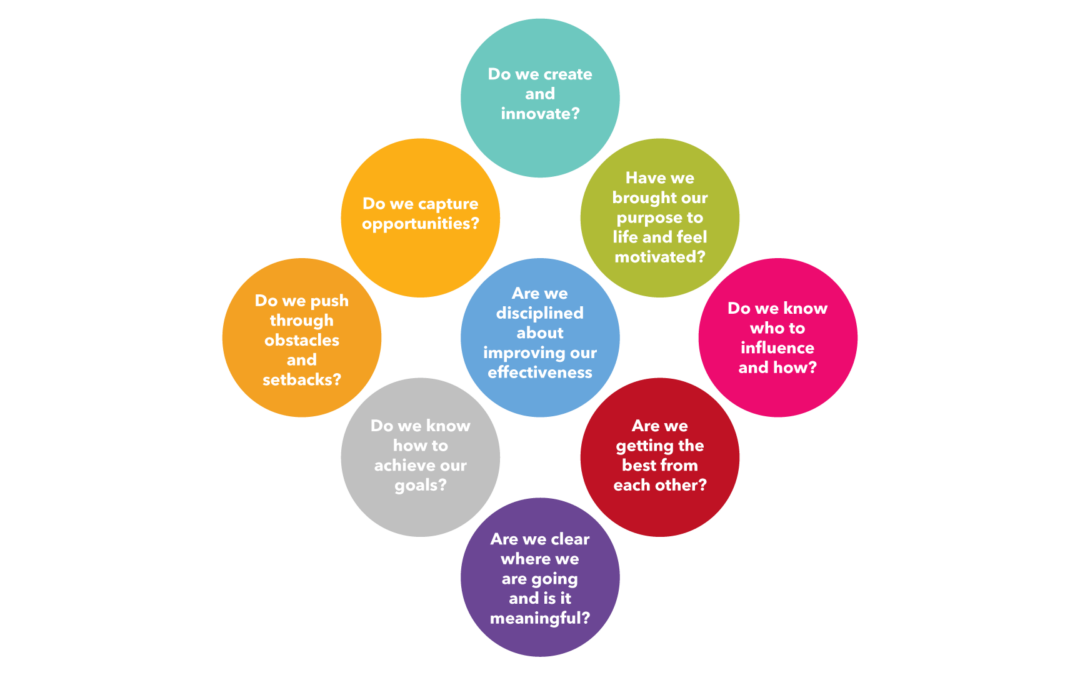The high-performing, high-learning team
Where do high-performing, high-learning teams come from?
If you believe the status quo, it’s a simple question of starting with the right people, doing a bit of social ‘team building’, and then hours clocked working together… and hey presto, a High-Performing Team.
That’s what we find most team leaders do: put together or join a team, book a team-build, maybe run through a psychometric if you’re a fan of data, and then get down to business. Even if you’re holding regular retrospectives, you’ve probably found these focusing on the tasks the team performs, rather than the effectiveness of the team itself.
A simple structure for team development
In reality, team performance is a continuing journey of development. But development without structure means teams meander, struggling to turn good intentions into tangible performance improvements.
Jyre asks teams 9 straightforward questions and then provides structured pathways that help teams focus their development effort on the areas that will make most difference.
This 9 Questions model builds directly out of the 9 Character types from the Jyre framework, ensuring that individual and team development are guided by the same coherent framework.
The 9 Questions
So, we have nine straightforward questions to ask you and your team:
- are we disciplined in working to improve our effectiveness and performance?
- do we know where we are going and believe we are doing something meaningful?
- do we know how to achieve our goals?
- do we get the best from each other?
- do we push through obstacles and setbacks?
- do we know who to influence and how?
- do we spot and capture opportunities along the way?
- have we brought our purpose to life and feel motivated?
- do we create and innovate?
If you have clear and positive answers to all 9 questions, and if the rest of your team and stakeholders agree with you — congratulations! You’re already a guaranteed high-performance, high-learning team. Of course, there’s plenty you can do to keep honing your edge as a team, finding ways of keeping yourselves sharp and finding routes to break-through performance.
What’s more likely, however, is that one or more areas represent gaps and that’s where the Jyre team pathways come into their own. They offer structured, self-supported development that systematically helps teams turn gaps into strengths.
Next, let’s put the different questions together.
Team disciplines
We focus teams first on the central question in the model: on team disciplines. These are disciplines that form the core of team performance and development.
The core of high performance:
Why disciplines? Quite simply, if you watch any sports team, music group, theatre group or any other performance group you will see one clear difference to most business teams. It’s that they rehearse, practice and train together so that, come their performance, they are as united and as effortless in playing together as possible.
By contrast, most teams in business and organisational life focus the vast majority of their time on performing the task at hand and very little on the disciplines of development: working at getting better at working together.
New teams
If you’re a new team, or new to team leadership, the chances are you won’t know the definitive answer to the 9 Questions yet, so we would usually recommend you focus your energies initially on the ‘foundational four’ questions:
The Foundational Four:
Exploring these questions will help you rapidly create a team that is clear what its purpose is, feels motivated to achieve its goals, has a good enough idea how to reach these goals, and has set a foundation of inclusion and valuing of each team member’s contribution.
The performing team
If you’re a team that’s been together for a while, there’s a good chance you’re already clear about your goals and what you need to do to get there. You may also be clear about each team members’ role and contribution, how the team can get the best from each other. In other words, the ‘foundational four’ questions are clear to you.
But you may feel that there’s a performance break-through your team needs to achieve, in which case the ‘central three’ questions could be just what you need.
The Performing Team:
The established team
If your team is well established and has been performing strongly for a while, it may be time to shake the team up a bit and see if it can find new opportunities, new innovations, new energy to take itself to the next level.
Re-energising the Team
Exploring these four questions will guide you as a team to find fresh energy and inspiration.
Team Effectiveness Review
A structured way to start is through the Jyre Team Effectiveness Review: it’s a quick way of getting your team’s views on the 9 Questions and serves as a diagnostic as to where your team should focus its development.


